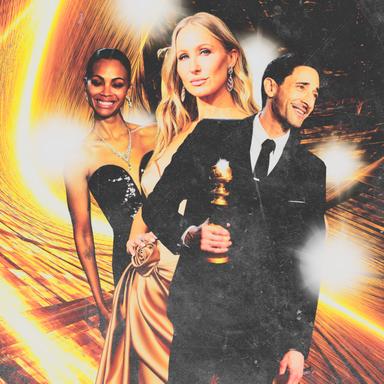As a great British rock star once reminded us, it’s a fine line between stupid and clever. The new Robbie Williams biopic, Better Man, finds that line and snorts it, in through one CGI chimpanzee nostril and out the other. “There’s nothing glamorous about a monkey doing cocaine. It’s actually a bit sad and uncomfortable,” said the film’s director, Michael Gracey, in an interview with The Independent that navigated the creation and production of 2024’s strangest and most beguiling movie. As potential taglines go, you could definitely do worse.
Better Man’s marketing team could probably use the help: Since arriving in theaters in limited release over Christmas, the film has grossed less than $100,000 in the United States. Considering Williams’s failure to break big in the States—even as he was selling tens of millions of records in the U.K. and around the world—the film’s commercial failure in America scans, in retrospect, as a self-fulfilling prophecy. That’s bad news for its financiers, but it’s also part of its intrigue. The tension between Williams’s relative obscurity and the over-amped absurdist style of the filmmaking renders Gracey’s movie more akin to an alien transmission, a signal intercepted en route from deep space and beamed into mostly empty multiplex auditoriums.
Better Man is a considerably wilder movie than either of 2024’s other musically inclined holiday flicks, Wicked and A Complete Unknown. It’s also more artistically successful, even as it somehow enfolds its competitors into each other. This is surely the only movie in history to juxtapose images of a flying monkey alongside realistic sequences depicting the writing and recording of chart-topping pop songs. While we’re taking inventory, Better Man also sees and raises Smile 2’s horror-movie tableaus of demonic, rictus-grinning pop stans; equals Kingdom of the Planet of the Apes’ performance-capture technique; and surpasses The Brutalist’s depiction of heroin-augmented sex. As far as older movies go, it might be easier to list the jukebox musicals that aren’t actively or accidentally evoked through the film’s allusive, fugue-state presentation. One scene set in Piccadilly Circus evokes A Hard Day’s Night; a sing-along climax recalls Bohemian Rhapsody. There’s maximalism, and then there’s Better Man. [Extreme Stefon voice]: This movie has everything.
“I came out of the womb with jazz hands,” says Robbie via the snarky confessional voice-over that’s been slathered over Better Man’s story from start to finish. Although Williams doesn’t technically have a writing credit on the screenplay, the material—co-scripted by Gracey with Simon Gleeson and Oliver Cole—has been shaped, with equal measures of affection and finesse, in his image. That image, as you probably know by now, is of a slouchy, photorealistic, anthropomorphic primate (embodied by Jonno Davies), whose hairiness beneath an ever-shifting wardrobe of tracksuits, trainers, and bespoke toques transforms him into a walking—and talking, and singing—sight gag. It helps that the joke is a good one, playing into Williams’s specific anxieties about his own lack of personal evolution after being handed the world on a string at the age of 15. The disguise also literalizes deeper myths of exploitation, exhibitionism, and addiction: the junkie rendered invisible from the proverbial monkey on his back.
Williams has actually examined the simian-human gap in his songs before, most notably in Escapology’s standout ballad “Come Undone,” in which he described himself as “so well trained, so animal.” While Better Man is filled with songs from Williams’s back catalog—most of which hold up pretty nicely as I-Love-the-’90s artifacts—it’s most deeply informed by “Come Undone” and its bracing sense of self-laceration. The song takes place in the aftermath of an all-night binge, with shivery hints of self-destruction (“they’re selling razorblades and mirrors in the streets”); it pivots on Williams’s poignant assertion, directed simultaneously at his semi-estranged father and the country he came to emblematize at the height of his success: “I’m scum, and I’m your son.”
You honestly don’t have to know anything about Robbie Williams’s career as a solo artist, nor his previous, star-making stint as the “cheeky one” in the world-beatingly cheesy boy band Take That, in order to enjoy Better Man. The film makes a gleeful fetish of its own factual unreliability even as it lays out the players and stakes of the Cool Britannia era in broad, vivid strokes (while integrating doctored footage from various television interviews and awards ceremonies into the narrative). Not only are the other characters being seen explicitly through Robbie’s eyes, but the voice-over makes it clear which ones he’s still on good terms with in real life and which ones he feels obliged (or legally free) to trash. For instance, Guy Chambers, the piano man and producer who cowrote most of Williams’s best songs—including “Angels,” “Millennium,” and “Rock DJ”—is played sympathetically by Tom Budge, while Gary Barlow, Williams’s rival in Take That, comes off as a callow and competitive pretty boy. As for the group’s manager, Nigel Martin-Smith (Damon Herriman)—a shrewd huckster who plucked Williams out of his hometown of Stoke-on-Trent and ended up suing his former discovery for breach of contract, with Williams subsequently releasing a song detailing his wish to gouge the man’s eyes out—he’s depicted as scheming, vindictive, and short-sighted. He’s also referred to, more than once, as a word rhyming with “punt.”
Nobody comes off worse in Better Man than Williams himself; the best way to head off accusations of a movie being produced solely as a $100 million vanity project is to make its contents as unflattering as possible. Having emerged out the other side of his infamy as a relaxed pop-world elder statesman, Williams has evidently given the filmmakers permission to let it rip. There’s sympathetic pathology in the setup of Robbie striving (and mostly failing) to please his callow, wannabe-entertainer father, Peter (Steve Pemberton), whose abandonment of his family to chase D-list celebrity becomes the primal scene of his son’s need for attention. But it’s also made abundantly clear that the wretched excesses of Robbie’s lifestyle after breaking big with Take That—like showing up drunk, stoned, and worse to gigs on a regular basis and alienating his bandmates to the point of expulsion—are entirely on his own furry head. The passages dramatizing the singer’s tumultuous relationship with All Saints starlet Nicole Appleton (Raechelle Banno), which ended after the latter was pressured into an abortion by record company executives, are impressively harrowing; if you think it’s sad to see a monkey doing cocaine, imagine him nodding out on the toilet while the love of his life slips her engagement ring under the bathroom door and leaves him for Liam Gallagher.
The cognitive dissonance of watching a movie that keeps trying to prod raw, exposed nerves beneath a stridently airbrushed visual presentation is real, and it’s probably worth asking whether Better Man’s eerily anodyne mixture of spectacle and sincerity is good or evil, cinematically speaking. Or maybe, as per Friedrich Nietzsche, who once asked, not-so-rhetorically, “What is the ape to man?” the actual verdict lies beyond such Manichaean binaries. Regardless of how much Better Man actually works, it’s one of the only recent movies made at its budget level with a genuinely interesting relationship between its form and content. Is it giving Gracey and his collaborators too much credit to suggest that his film’s defiant artificiality works as a critique on the phoniness of focus-grouped acts like Take That? Or as a commentary on the inherently ersatz nature of most other showbiz bildungsromans that don’t have a chimpanzee for a protagonist?
The craftsmanship mostly earns the benefit of the doubt. Where a movie like Wicked simply features actors singing and dancing against stylized backdrops, Better Man turns those backdrops into fully realized psychic landscapes that shimmer and melt and fly apart as Robbie comes undone. At this point, it’s a little boring to describe a certain grade of self-consciously outrageous filmmaking as “batshit.” But when you’re watching what looks like Caesar from Planet of the Apes engage in gory, R-rated combat with dozens of his own doppelgängers while also performing “Let Me Entertain You” at a re-creation of the Knebworth main stage circa 2003, and then one of the Robbies, who is walking around skinless as per the controversial music video for “Rock DJ,” gets decapitated on the battlefield and his head sails over the crowd … well at that point, it’s safe to say that the batshit, along with everything else, has hit the fan.
Ultimately, Better Man is a film that’s considerably harder to fathom than it is to like. It’s quite easy to like partly because the ratio of satire to sentimentality is mostly well-managed, and partly because Williams, whose double-act with Davies represents some sort of landmark in collaborative performance, proves an ideal ringmaster for Gracey’s carnivalesque aesthetic. The director has swapped the almost cosmic tackiness of his previous film, The Greatest Showman, for a more endearing form of chutzpah—stumbling upon the cinematic version of a vintage, Rat Pack celebrity roast. The movie opens and closes with cover versions of “My Way,” belted out by two different versions of Robbie: one young, one old, both stranded on the wrong side of the uncanny valley in thrall to Frank Sinatra. Robbie Williams isn’t Frank, but Better Man makes you believe that they’re at least the same species. To paraphrase Ol’ Blue Eyes himself, I found it all so amusing, and you might, too.



